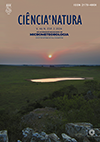Tests of photovoltaic modules in a wind tunnel: scale effects and aerodynamic interactions
DOI:
https://doi.org/10.5902/2179460X87757Keywords:
Solar panels, Wind effects, Aerodynamic pressuresAbstract
Results of a study carried out in the UNNE wind tunnel to evaluate the aerodynamic loads on panels of a solar park are presented. The experimental study analyses the model scale effects that occur when two models with different characteristics are used. Likewise, the effects of aerodynamic interaction resulting from the relative location of the panels within the park are analysed. Firstly, a preliminary dynamic/numerical evaluation is carried out and then aerodynamic coefficients are experimentally determined, which will allow the quasi-static analysis of the structure of the panel-tracker system.
Downloads
References
CENTRO DE INVESTIGACIÓN DE LOS REGLAMENTOS NACIONALES DE SEGURIDAD PARA LAS OBRAS CIVILES. Reglamento Argentino de Acción del Viento sobre las Construcciones. CIRSOC 102, INTI, Bs. As., 2001.
DI RADO, H.; MROGINSKI, J.; BENEYTO, P.; AWRUCH, A. A symmetric constitutive matrix for the nonlinear analysis of hypoelastic solids based on a formulation leading to a non-symmetric stiffness matrix. Commun. Numer. Methods Eng. 24 (11), 1079–1092, 2008.
VAJA, N. K.; BARRY, O. R.; TANBOUR, E. Y. On the modeling and analysis of a vibration absorber for overhead powerlines with multiple resonant frequencies. Engineering Structures, 175: 711-720, 2018.
WARSIDO, W.P.; BITSUAMLAK, G.T.; BARATA, J.; CHOWDHURY, A.G. Influence of spacing parameters on the wind loading of solar array. J. Fluids Struct. 48, 295–315, 2014.
WITTWER, A. R.; PODESTÁ, J. M.; CASTRO, H. G.; MROGINSKI, J. L.; MARIGHETTI, J. O.; DE BORTOLI, M. E.; PAZ, R. R.; MATEO, F. Wind loading and its effects on photovoltaic modules: An experimental - computational study to assess the stress on structures. Solar Energy, 240, 315-328, 2022.
WITTWER, A.R.; MÖLLER, S.V. Characteristics of the low-speed wind tunnel of the UNNE. J. Wind Eng. Ind. Aerodyn. 84 (3), 307–320, 2000.
ZIENKIEWICZ, O.C.; TAYLOR, R.L. The Finite Element Method for Solid and Structural Mechanics. Elsevier, 2005.
Downloads
Published
How to Cite
Issue
Section
License
Copyright (c) 2024 Ciência e Natura

This work is licensed under a Creative Commons Attribution-NonCommercial-ShareAlike 4.0 International License.
To access the DECLARATION AND TRANSFER OF COPYRIGHT AUTHOR’S DECLARATION AND COPYRIGHT LICENSE click here.
Ethical Guidelines for Journal Publication
The Ciência e Natura journal is committed to ensuring ethics in publication and quality of articles.
Conformance to standards of ethical behavior is therefore expected of all parties involved: Authors, Editors, Reviewers, and the Publisher.
In particular,
Authors: Authors should present an objective discussion of the significance of research work as well as sufficient detail and references to permit others to replicate the experiments. Fraudulent or knowingly inaccurate statements constitute unethical behavior and are unacceptable. Review Articles should also be objective, comprehensive, and accurate accounts of the state of the art. The Authors should ensure that their work is entirely original works, and if the work and/or words of others have been used, this has been appropriately acknowledged. Plagiarism in all its forms constitutes unethical publishing behavior and is unacceptable. Submitting the same manuscript to more than one journal concurrently constitutes unethical publishing behavior and is unacceptable. Authors should not submit articles describing essentially the same research to more than one journal. The corresponding Author should ensure that there is a full consensus of all Co-authors in approving the final version of the paper and its submission for publication.
Editors: Editors should evaluate manuscripts exclusively on the basis of their academic merit. An Editor must not use unpublished information in the editor's own research without the express written consent of the Author. Editors should take reasonable responsive measures when ethical complaints have been presented concerning a submitted manuscript or published paper.
Reviewers: Any manuscripts received for review must be treated as confidential documents. Privileged information or ideas obtained through peer review must be kept confidential and not used for personal advantage. Reviewers should be conducted objectively, and observations should be formulated clearly with supporting arguments, so that Authors can use them for improving the paper. Any selected Reviewer who feels unqualified to review the research reported in a manuscript or knows that its prompt review will be impossible should notify the Editor and excuse himself from the review process. Reviewers should not consider manuscripts in which they have conflicts of interest resulting from competitive, collaborative, or other relationships or connections with any of the authors, companies, or institutions connected to the papers.






